状语从句的用法归纳
英语状语从句归纳总结
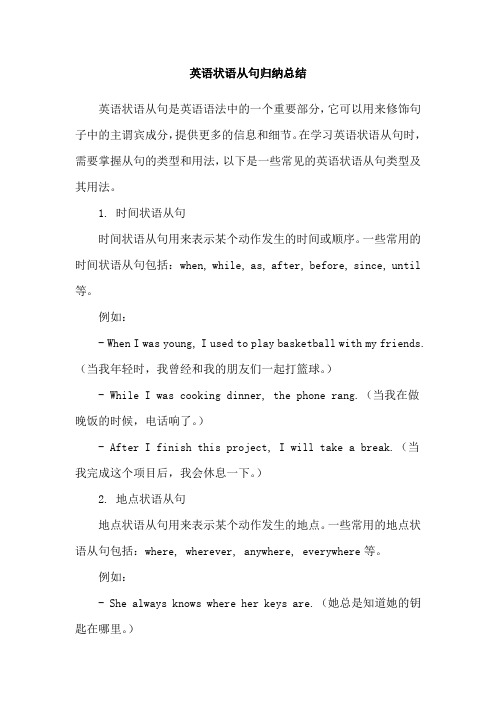
英语状语从句归纳总结英语状语从句是英语语法中的一个重要部分,它可以用来修饰句子中的主谓宾成分,提供更多的信息和细节。
在学习英语状语从句时,需要掌握从句的类型和用法,以下是一些常见的英语状语从句类型及其用法。
1. 时间状语从句时间状语从句用来表示某个动作发生的时间或顺序。
一些常用的时间状语从句包括:when, while, as, after, before, since, until 等。
例如:- When I was young, I used to play basketball with my friends.(当我年轻时,我曾经和我的朋友们一起打篮球。
)- While I was cooking dinner, the phone rang.(当我在做晚饭的时候,电话响了。
)- After I finish this project, I will take a break.(当我完成这个项目后,我会休息一下。
)2. 地点状语从句地点状语从句用来表示某个动作发生的地点。
一些常用的地点状语从句包括:where, wherever, anywhere, everywhere等。
例如:- She always knows where her keys are.(她总是知道她的钥匙在哪里。
)- Wherever he goes, he takes his laptop with him.(无论他去哪里,他都带着他的笔记本电脑。
)3. 原因状语从句原因状语从句用来表示某个动作发生的原因。
一些常用的原因状语从句包括:because, since, as, now that等。
例如:- Because it was raining, we decided to stay indoors.(因为下雨了,我们决定呆在室内。
)- Since you didn't like the movie, we can watch something else.(既然你不喜欢这部电影,我们可以看其他的。
状语从句的引导词的用法
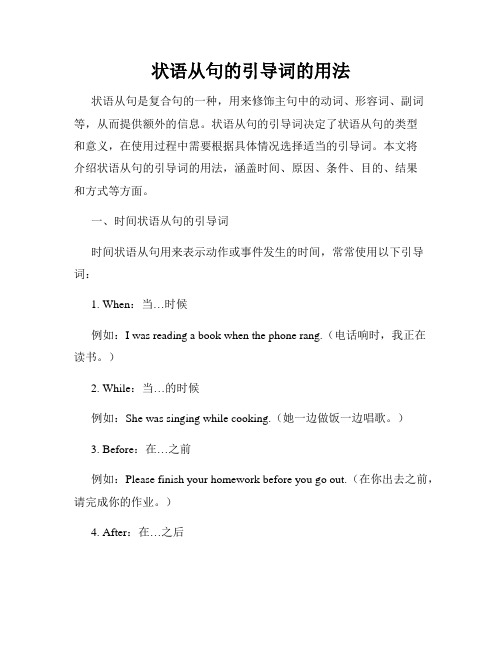
状语从句的引导词的用法状语从句是复合句的一种,用来修饰主句中的动词、形容词、副词等,从而提供额外的信息。
状语从句的引导词决定了状语从句的类型和意义,在使用过程中需要根据具体情况选择适当的引导词。
本文将介绍状语从句的引导词的用法,涵盖时间、原因、条件、目的、结果和方式等方面。
一、时间状语从句的引导词时间状语从句用来表示动作或事件发生的时间,常常使用以下引导词:1. When:当…时候例如:I was reading a book when the phone rang.(电话响时,我正在读书。
)2. While:当…的时候例如:She was singing while cooking.(她一边做饭一边唱歌。
)3. Before:在…之前例如:Please finish your homework before you go out.(在你出去之前,请完成你的作业。
)4. After:在…之后例如:She always takes a walk after she finishes her work.(她工作结束后总是去散步。
)二、原因状语从句的引导词原因状语从句用来解释主句中的原因或理由,常常使用以下引导词:1. Because:因为例如:He couldn't come because he was sick.(他因为生病来不了。
)2. Since:因为例如:He hasn't replied to my email since he left.(自从他离开以来,他没有回复我的邮件。
)3. As:由于例如:As she was tired, she decided to go to bed early.(由于她很累,她决定早点上床睡觉。
)三、条件状语从句的引导词条件状语从句用来表示某种条件下发生的情况,常常使用以下引导词:1. If:如果例如:If it rains, we will stay at home.(如果下雨了,我们就待在家里。
状语从句的引导词及用法

状语从句的引导词及用法状语从句是复合句的一种,它用来修饰主句中的动词、形容词、副词或整个句子,起到表示时间、条件、原因、目的、结果等关系的作用。
在状语从句中,引导词起到连接主句和从句的作用,不同的引导词对应不同的语法功能。
本文将介绍常见的状语从句引导词及其用法。
1. 时间状语从句时间状语从句用来表示动作或状态发生的时间。
常见的引导词有:when(当...的时候)、while(当...的时候)、before(在...之前)、after(在...之后)、since(自从...以来)等。
例句:- I will call you when I arrive in Beijing.(当我到达北京时,我会给你打电话。
)- While I was studying, my sister was watching TV.(当我正在学习时,我妹妹在看电视。
)- Before I go to bed, I always brush my teeth.(睡觉前,我总是刷牙。
)- After I finished my homework, I went to play basketball.(在我完成作业之后,我去打篮球了。
)- Since she moved to New York, she has made many friends.(自从她搬到纽约以来,她交到了很多朋友。
)2. 条件状语从句条件状语从句用来表示动作发生的条件。
常见的引导词有:if(如果)、unless(除非)、provided that(只要)、as long as(只要)、in case(万一)等。
例句:- If it rains tomorrow, we will stay at home.(如果明天下雨,我们会待在家里。
)- I will go to the party unless I am busy.(我会去参加派对,除非我很忙。
)- You can go out, provided that you finish your homework.(只要你完成作业,你可以出去。
英语八类状语从句的用法归纳

英语八类状语从句的用法归纳-CAL-FENGHAI.-(YICAI)-Company One1英语八类状语从句的用法归纳一、概说状语从句即指在主从复合句用作状语的从句。
按照其意义,状语从句可分为时间状语从句、地点状语从句、原因状语从句、目的状语从句、结果状语从句、条件状语从句、让步状语从句等。
状语从句是高中英语学习中的一个语法重点,也是历年高考重点考查的内容之一。
学习状语从句主要应注意引导状语从句的从属连词的用法与区别,以及从属连词在一定的语言环境中的意义与用法。
二、时间状语从句1.引导时间状语从句的从属连词很多,常见的有before, after, when, while, as, since, till, until, as soon as 等。
2.表示“当…时候”的 while, when, as 的用法区别是:while从句中的谓语动词必须是延续性动词;表示带有规律性的“每当”或当主、从句谓语动词的动作发生有先后时,只能用 when;当表示“一边…一边…”或“随着”时,只能用 as。
另外,用于此义的 as 所引导的时间状语从句谓语只能是动作动词,不能是状态动词。
如下面一道高考题的答案是 B 而不能是A:“I’m going to the post office.” “_____ you’re there, can you get me some stamps”A. AsB. WhileC. BecauseD. If3. until 在肯定句中通常只连用延续性动词,表示相应动作结束的时间;在否定句中通常连用非延续性动词,表示相应动作开始的时间,意为“直到…才”。
如:He waited until she was about to leave. 他等着一直到她准备离开。
I did not begin to work till he had gone. 他走了后我才开始工作。
4.表示“一…就”除用 as soon as 外,还可用 the minute, the second, the instant, immediately, directly, instantly, no sooner…than, hardly…when等。
状语从句的种类及用法
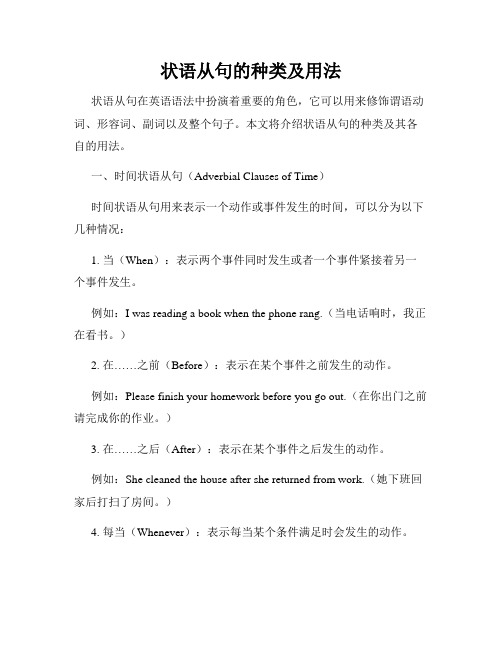
状语从句的种类及用法状语从句在英语语法中扮演着重要的角色,它可以用来修饰谓语动词、形容词、副词以及整个句子。
本文将介绍状语从句的种类及其各自的用法。
一、时间状语从句(Adverbial Clauses of Time)时间状语从句用来表示一个动作或事件发生的时间,可以分为以下几种情况:1. 当(When):表示两个事件同时发生或者一个事件紧接着另一个事件发生。
例如:I was reading a book when the phone rang.(当电话响时,我正在看书。
)2. 在……之前(Before):表示在某个事件之前发生的动作。
例如:Please finish your homework before you go out.(在你出门之前请完成你的作业。
)3. 在……之后(After):表示在某个事件之后发生的动作。
例如:She cleaned the house after she returned from work.(她下班回家后打扫了房间。
)4. 每当(Whenever):表示每当某个条件满足时会发生的动作。
例如:Whenever I feel sad, I listen to music.(每当我感到伤心时,我会听音乐。
)二、地点状语从句(Adverbial Clauses of Place)地点状语从句用来表示一个动作或事件发生的地点,以下是其中几种情况:1. 哪里(Where):表示某个事件发生的地点。
例如:I will meet you where we had our first date.(我会在我们初次约会的地方见你。
)2. 无论……哪里(Wherever):表示不论在哪里发生的动作。
例如:Wherever you go, I'll go.(无论你去哪里,我都会去。
)三、原因状语从句(Adverbial Clauses of Reason)原因状语从句用来表示一个动作或事件发生的原因,以下是其中几种情况:1. 因为(Because):表示由于某个原因而发生的动作。
初三状语从句的用法归纳

1. 时间状语从句常用引导词:when, whenever, as, while, as soon as, before, after, since, till,until。
特殊引导词:the minute, the moment, the second, every time, the day, the instant, immediately, directly, no sooner…than, hardly…when, scarcely…when。
例句①:As time went on, his theory proved to be correct.语法:这是一个主从复合句。
As引导的是时间状语从句。
译文:随着时间的推移,他的理论被证明是正确的。
例句②:The minute you do this, you'll lose control.语法:这是一个主从复合句。
The minute引导的是时间状语从句。
译文:你一旦做了这件事,就会失去控制。
2. 地点状语从句常用引导词:where。
特殊引导词:wherever, anywhere, everywhere。
例句①:A new school building was put up where there had once been a theatre. 语法:这是一个主从复合句,where引导的是地点状语从句。
译文:一所新的学校在以前的剧院处建成了。
例句②:Everywhere they went, the distinguished guests were warmly welcomed. 语法:这是一个主从复合句,Everywhere引导的是地点状语从句。
译文:贵宾们每到一处都受到了热烈欢迎。
3. 原因状语从句常用引导词:because, since, as, for。
特殊引导词:seeing that, now that, in that, considering that, given that。
英语中状语从句的用法

在英语中,状语从句是用来修饰动词、形容词、副词或整个句子的从句,它的作用是表示行为或状态的条件、时间、地点、原因、结果、方式或修饰整个句子。
以下是一些常见的状语从句类型:1. 时间状语从句:表示时间条件的从句。
常见的引导词有:when, as, while, before, after, since, until, once, as soon as 等。
例句:When you finish your homework, you can go out to play.2. 地点状语从句:表示地点条件的从句。
常见的引导词有:where, wherever等。
例句:Wherever you go, please take care of yourself.3. 原因状语从句:表示原因条件的从句。
常见的引导词有:because, since, as, for等。
例句:She didn't go to school yesterday because she was ill.4. 结果状语从句:表示结果条件的从句。
常见的引导词有:so that, so...that, such...that等。
例句:She worked hard so that she could pass the exam.5. 方式状语从句:表示行为方式的从句。
常见的引导词有:as, as if, as though等。
例句:He treated his mother as if she were a stranger.6. 条件状语从句:表示条件假设的从句。
常见的引导词有:if, unless, as long as等。
例句:If it doesn't rain tomorrow, we will go for a picnic.总之,状语从句是英语语法中的一个重要部分,掌握好状语从句的用法可以帮助我们更好地理解和运用英语。
状语从句的引导词和用法

状语从句的引导词和用法状语从句是指在复合句中充当状语的从句,用来修饰主句的动作或者描述主句的条件、原因、方式、时间、地点等情况。
状语从句的引导词是连接状语从句与主句的词语,根据从句的性质和意义不同,引导词也有所区别。
下面将详细介绍状语从句的引导词和用法。
1. 时间状语从句时间状语从句用来描述主句中动作发生的时间,常用的引导词有:when(当……时候)、while(当……的时候)、as(当……的时候)、before(在……之前)、after(在……之后)、since(自从……以来)、until/till(直到……为止)等。
例如:- I will call you when I arrive at the airport.(当我到达机场的时候,我会给你打电话。
)- He was reading a book while his sister was studying.(当他的妹妹在学习的时候,他正在看书。
)- After he finished his homework, he went to bed.(在他完成作业后,他就去睡觉了。
)2. 地点状语从句地点状语从句用来描述主句中动作发生的地点,常用的引导词有:where(在哪里)、wherever(无论在哪里)、anywhere(在任何地方)等。
例如:- She went to the park where she met her friends.(她去了公园,在那里遇见了她的朋友。
)- You can choose to study wherever you feel comfortable.(你可以选择在任何你感到舒服的地方学习。
)3. 条件状语从句条件状语从句用来描述主句中动作发生的条件,常用的引导词有:if(如果)、unless(除非)、as long as(只要)、provided(以……为条件)、on the condition that(在……的条件下)等。
状语从句的引导词与用法
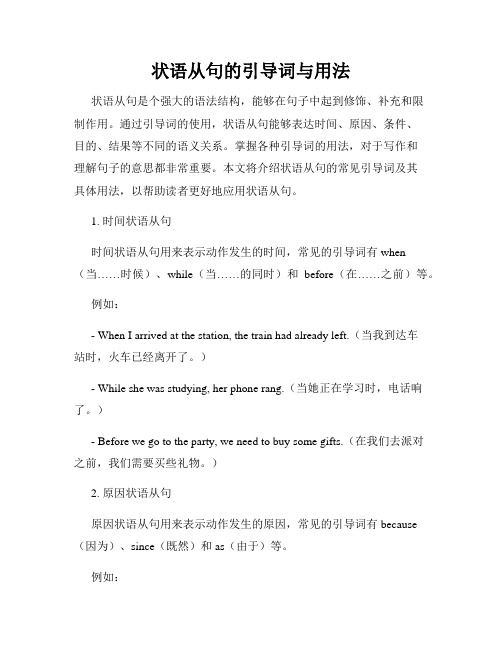
状语从句的引导词与用法状语从句是个强大的语法结构,能够在句子中起到修饰、补充和限制作用。
通过引导词的使用,状语从句能够表达时间、原因、条件、目的、结果等不同的语义关系。
掌握各种引导词的用法,对于写作和理解句子的意思都非常重要。
本文将介绍状语从句的常见引导词及其具体用法,以帮助读者更好地应用状语从句。
1. 时间状语从句时间状语从句用来表示动作发生的时间,常见的引导词有when (当……时候)、while(当……的同时)和before(在……之前)等。
例如:- When I arrived at the station, the train had already left.(当我到达车站时,火车已经离开了。
)- While she was studying, her phone rang.(当她正在学习时,电话响了。
)- Before we go to the party, we need to buy some gifts.(在我们去派对之前,我们需要买些礼物。
)2. 原因状语从句原因状语从句用来表示动作发生的原因,常见的引导词有because (因为)、since(既然)和as(由于)等。
例如:- I couldn't go to the party because I had to work.(我不能去参加派对,因为我得工作。
)- Since it's raining, we should take an umbrella.(既然下雨了,我们应该带把伞。
)- As he was tired, he decided to go to bed early.(由于他累了,他决定早点上床睡觉。
)3. 条件状语从句条件状语从句用来表示动作发生的条件,常见的引导词有if(如果)、unless(除非)和when(当……时候)等。
例如:- If it rains tomorrow, we will stay at home.(如果明天下雨,我们会呆在家里。
状语从句的特殊用法大全
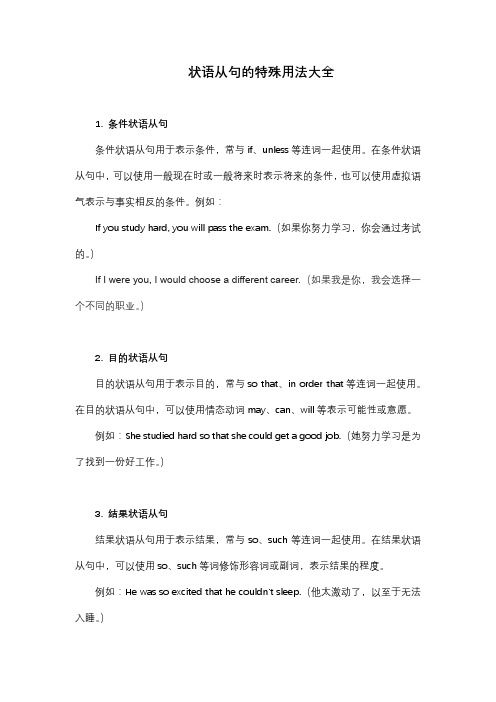
状语从句的特殊用法大全1. 条件状语从句条件状语从句用于表示条件,常与if、unless等连词一起使用。
在条件状语从句中,可以使用一般现在时或一般将来时表示将来的条件,也可以使用虚拟语气表示与事实相反的条件。
例如:If you study hard, you will pass the exam.(如果你努力学习,你会通过考试的。
)If I were you, I would choose a different career.(如果我是你,我会选择一个不同的职业。
)2. 目的状语从句目的状语从句用于表示目的,常与so that、in order that等连词一起使用。
在目的状语从句中,可以使用情态动词may、can、will等表示可能性或意愿。
例如:She studied hard so that she could get a good job.(她努力学习是为了找到一份好工作。
)3. 结果状语从句结果状语从句用于表示结果,常与so、such等连词一起使用。
在结果状语从句中,可以使用so、such等词修饰形容词或副词,表示结果的程度。
例如:He was so excited that he couldn't sleep.(他太激动了,以至于无法入睡。
)4. 地点状语从句地点状语从句用于表示地点,常与where、wherever等连词一起使用。
在地点状语从句中,可以使用陈述句或虚拟语气,表示具体地点或可能性。
例如:Go where you want to go.(去你想去的地方。
)5. 时间状语从句时间状语从句用于表示时间,常与when、whenever等连词一起使用。
在时间状语从句中,可以使用一般现在时、一般过去时、将来时等表示具体时间或时间顺序。
例如:When you are ready, we can start.(当你准备好了,我们就可以开始。
)6. 让步状语从句让步状语从句用于表示尽管有困难或反对,但仍然坚持做某事。
状语从句的用法归纳总结
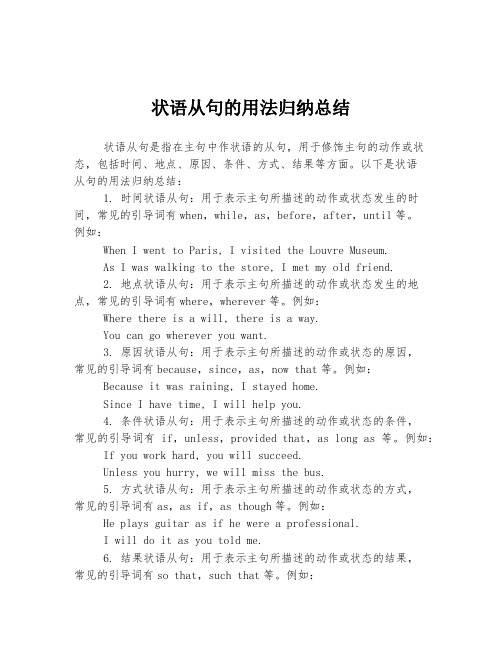
状语从句的用法归纳总结状语从句是指在主句中作状语的从句,用于修饰主句的动作或状态,包括时间、地点、原因、条件、方式、结果等方面。
以下是状语从句的用法归纳总结:1. 时间状语从句:用于表示主句所描述的动作或状态发生的时间,常见的引导词有when,while,as,before,after,until等。
例如:When I went to Paris, I visited the Louvre Museum.As I was walking to the store, I met my old friend.2. 地点状语从句:用于表示主句所描述的动作或状态发生的地点,常见的引导词有where,wherever等。
例如:Where there is a will, there is a way.You can go wherever you want.3. 原因状语从句:用于表示主句所描述的动作或状态的原因,常见的引导词有because,since,as,now that等。
例如:Because it was raining, I stayed home.Since I have time, I will help you.4. 条件状语从句:用于表示主句所描述的动作或状态的条件,常见的引导词有if,unless,provided that,as long as等。
例如:If you work hard, you will succeed.Unless you hurry, we will miss the bus.5. 方式状语从句:用于表示主句所描述的动作或状态的方式,常见的引导词有as,as if,as though等。
例如:He plays guitar as if he were a professional.I will do it as you told me.6. 结果状语从句:用于表示主句所描述的动作或状态的结果,常见的引导词有so that,such that等。
高考英语语法复习:八种状语从句的用法

高考英语语法复习:八种状语从句的用法状语从句状语从句有时间、地点、原因、目的、方式、结果、条件、让步等八种。
一、时间状语从句:引导词有after,before,as,once,since,till,until,when,whenever,while,as soon as,the moment/minute…(一…就),the time,the day,every time,next time,each time,by the time of,no sooner…than(一…就),hardly…when(一…就).例如:Each/Every time he comes here,he will drop in on me.每次他来这儿他都顺便看我.He was ill last time I saw him.上次我见到他时他病了.No sooner had she heard the news than she cried.她一听到这个消息就哭了.[辨析]when与whilewhen引导的从句动词可以是延续性的或短暂性的,while引导的从句中动词必须是延续性的;在“be…when…”句式中when表“at that time(就在这时)”意,这样用的when不能换为while;while有时并不表示时间,而表示对比,意“而”、“却”,when无这样的用法。
例如:When I got home I found the door locked./While(或When)we were working in the fields,it suddenly began to rain./He was wandering through the streets when a bike hit him./His pencil is red,while mine is yellow.[辨析]till与until一般情况下可以互换,但until可以位于句首,till则不能。
英语中状语从句用法及例句总结(完整)
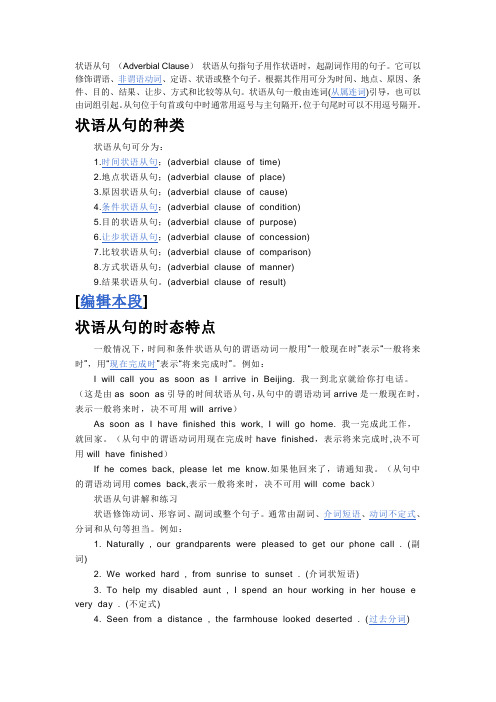
状语从句(Adverbial Clause)状语从句指句子用作状语时,起副词作用的句子。
它可以修饰谓语、非谓语动词、定语、状语或整个句子。
根据其作用可分为时间、地点、原因、条件、目的、结果、让步、方式和比较等从句。
状语从句一般由连词(从属连词)引导,也可以由词组引起。
从句位于句首或句中时通常用逗号与主句隔开,位于句尾时可以不用逗号隔开。
状语从句的种类状语从句可分为:1.时间状语从句;(adverbial clause of time)2.地点状语从句;(adverbial clause of place)3.原因状语从句;(adverbial clause of cause)4.条件状语从句;(adverbial clause of condition)5.目的状语从句;(adverbial clause of purpose)6.让步状语从句;(adverbial clause of concession)7.比较状语从句;(adverbial clause of comparison)8.方式状语从句;(adverbial clause of manner)9.结果状语从句。
(adverbial clause of result)[编辑本段]状语从句的时态特点一般情况下,时间和条件状语从句的谓语动词一般用“一般现在时”表示“一般将来时”,用“现在完成时”表示“将来完成时”。
例如:I will call you as soon as I arrive in Beijing. 我一到北京就给你打电话。
(这是由as soon as引导的时间状语从句,从句中的谓语动词arrive是一般现在时,表示一般将来时,决不可用will arrive)As soon as I have finished this work, I will go home. 我一完成此工作,就回家。
(从句中的谓语动词用现在完成时have finished,表示将来完成时,决不可用will have finished)If he comes back, please let me know.如果他回来了,请通知我。
高中英语知识点归纳状语从句的类型和用法
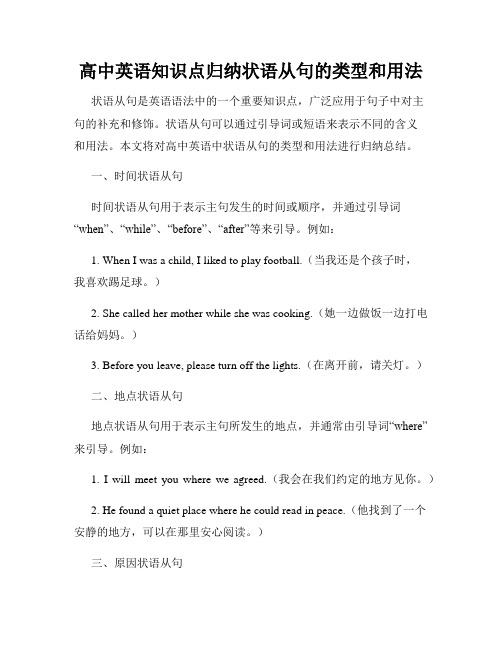
高中英语知识点归纳状语从句的类型和用法状语从句是英语语法中的一个重要知识点,广泛应用于句子中对主句的补充和修饰。
状语从句可以通过引导词或短语来表示不同的含义和用法。
本文将对高中英语中状语从句的类型和用法进行归纳总结。
一、时间状语从句时间状语从句用于表示主句发生的时间或顺序,并通过引导词“when”、“while”、“before”、“after”等来引导。
例如:1. When I was a child, I liked to play football.(当我还是个孩子时,我喜欢踢足球。
)2. She called her mother while she was cooking.(她一边做饭一边打电话给妈妈。
)3. Before you leave, please turn off the lights.(在离开前,请关灯。
)二、地点状语从句地点状语从句用于表示主句所发生的地点,并通常由引导词“where”来引导。
例如:1. I will meet you where we agreed.(我会在我们约定的地方见你。
)2. He found a quiet place where he could read in peace.(他找到了一个安静的地方,可以在那里安心阅读。
)三、原因状语从句原因状语从句用于表示主句的原因或解释,并通过引导词“because”、“since”、“as”来引导。
例如:1. He didn't go to school today because he was sick.(他今天没去上学,因为他生病了。
)2. Since it is raining heavily, we should stay indoors.(因为下大雨,我们应该待在室内。
)四、方式状语从句方式状语从句用于表示主句动作或状态的方式或方法,并通常由引导词“as”、“like”、“the way”来引导。
九大状语从句的用法

九大状语从句的用法
状语从句是在主句中作状语的从句,用于对主句进行补充说明。
以下是九大常用状语从句的用法:
1. 时间状语从句:表示时间关系的从句,如“当我到达时”、“每次他来的时候”。
2. 地点状语从句:表示地点关系的从句,如“无论他在哪里”、“他在家里”。
3. 原因状语从句:表示原因关系的从句,如“因为他生病了”、“由于下雨了”。
4. 条件状语从句:表示条件关系的从句,如“如果明天下雨”、“除非你希望”。
5. 结果状语从句:表示结果关系的从句,如“所以他没有来”、“因此我们赢得了比赛”。
6. 目的状语从句:表示目的关系的从句,如“为了学好英语”、“以便更好地理解”。
7. 方式状语从句:表示方式关系的从句,如“以这种方式”、“用手指点”。
8. 比较状语从句:表示比较关系的从句,如“就像他说的那样”、“和我一样高”。
9. 假设状语从句:表示假设关系的从句,如“如果我有钱”、“要是明天放假”。
以上是九大常见的状语从句的用法。
在使用状语从句时,需要注意从句与主句的时态和语态一致性,以及适当使用连词引导从句的开头。
初中英语知识点归纳状语从句的构成及用法

初中英语知识点归纳状语从句的构成及用法归纳:状语从句作为复合句的一种,由一个从属连词引导,修饰主句中的动词、形容词或副词,起到说明、程度、时间、条件、原因等作用。
状语从句的类型包括时间状语从句、地点状语从句、条件状语从句、原因状语从句、结果状语从句等。
一、时间状语从句时间状语从句是由when, while, as, before, after, since, until, as soon as 等引导的状语从句。
1. 当时When I arrived at the park, it started to rain.当我到达公园时,天开始下雨。
2. 同时While I was studying, my phone rang.当我在学习时,电话响了。
3. 一时间As he opened the door, a gust of wind rushed in.当他打开门时,一阵风涌了进来。
4. 先后Before I leave, I will finish my homework.在我离开之前,我会完成作业。
5. 之后After she finished dinner, she went for a walk.她吃完晚饭后,去散步了。
6. 自从Since I moved to this city, I have made many new friends.自从我搬到这个城市,我交了很多新朋友。
7. 直到I will wait here until you come back.我会在这里等到你回来。
8. 一……就……As soon as the bell rang, the students rushed out of the classroom.一响铃,学生们就冲出教室。
二、地点状语从句地点状语从句是由where, wherever引导的状语从句。
1. 在……的地方I will meet you where we first met.我会在我们第一次见面的地方见你。
状语从句的用法
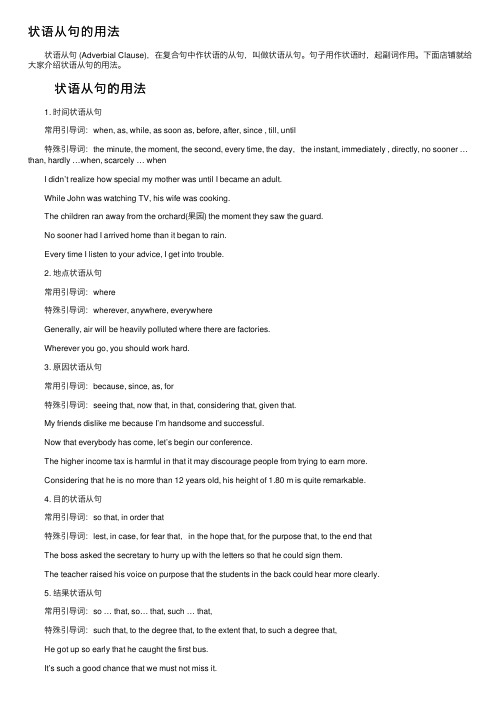
状语从句的⽤法 状语从句 (Adverbial Clause),在复合句中作状语的从句,叫做状语从句。
句⼦⽤作状语时,起副词作⽤。
下⾯店铺就给⼤家介绍状语从句的⽤法。
状语从句的⽤法 1. 时间状语从句 常⽤引导词:when, as, while, as soon as, before, after, since , till, until 特殊引导词:the minute, the moment, the second, every time, the day,the instant, immediately , directly, no sooner …than, hardly …when, scarcely … when I didn’t realize how special my mother was until I became an adult. While John was watching TV, his wife was cooking. The children ran away from the orchard(果园) the moment they saw the guard. No sooner had I arrived home than it began to rain. Every time I listen to your advice, I get into trouble. 2. 地点状语从句 常⽤引导词:where 特殊引导词:wherever, anywhere, everywhere Generally, air will be heavily polluted where there are factories. Wherever you go, you should work hard. 3. 原因状语从句 常⽤引导词:because, since, as, for 特殊引导词:seeing that, now that, in that, considering that, given that. My friends dislike me because I’m handsome and successful. Now that everybody has come, let’s begin our conference. The higher income tax is harmful in that it may discourage people from trying to earn more. Considering that he is no more than 12 years old, his height of 1.80 m is quite remarkable. 4. ⽬的状语从句 常⽤引导词:so that, in order that 特殊引导词:lest, in case, for fear that,in the hope that, for the purpose that, to the end that The boss asked the secretary to hurry up with the letters so that he could sign them. The teacher raised his voice on purpose that the students in the back could hear more clearly. 5. 结果状语从句 常⽤引导词:so … that, so… that, such … that, 特殊引导词:such that, to the degree that, to the extent that, to such a degree that, He got up so early that he caught the first bus. It’s such a good chance that we must not miss it. To such an degree was he excited that he couldn’t sleep last night. 6. 条件状语从句 常⽤引导词:if, unless, 特殊引导词:as/so long as, only if, providing/provided that, supposing that, in case that, on condition that We’ll start our project if the president agrees. You will certainly succeed so long as you keep on trying. Provided that there is no opposition, we shall hold the meeting here. 7. 让步状语从句 常⽤引导词:though, although, even if, even though 特殊引导词: as(⽤在让步状语从句中必须要倒装),while ( ⼀般⽤在句⾸ ),no matter …, in spite of the fact that, while, whatever, whoever, wherever, whenever, however, whichever Much as I respect him, I can’t agree to his proposal. 尽管我很尊敬他,我却不同意他的建议。
状语从句的引导词及用法
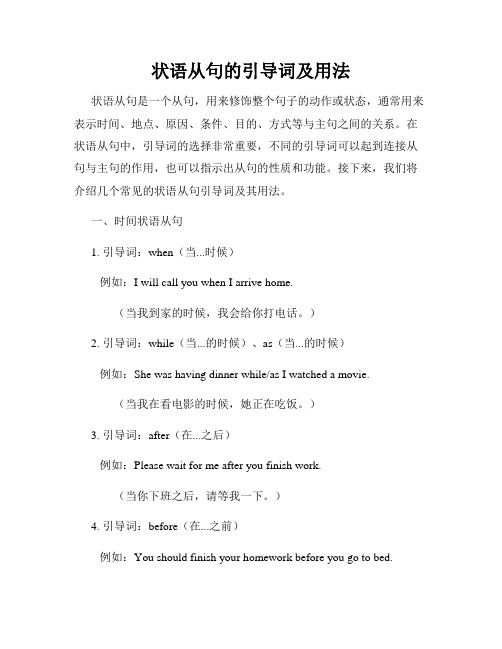
状语从句的引导词及用法状语从句是一个从句,用来修饰整个句子的动作或状态,通常用来表示时间、地点、原因、条件、目的、方式等与主句之间的关系。
在状语从句中,引导词的选择非常重要,不同的引导词可以起到连接从句与主句的作用,也可以指示出从句的性质和功能。
接下来,我们将介绍几个常见的状语从句引导词及其用法。
一、时间状语从句1. 引导词:when(当...时候)例如:I will call you when I arrive home.(当我到家的时候,我会给你打电话。
)2. 引导词:while(当...的时候)、as(当...的时候)例如:She was having dinner while/as I watched a movie.(当我在看电影的时候,她正在吃饭。
)3. 引导词:after(在...之后)例如:Please wait for me after you finish work.(当你下班之后,请等我一下。
)4. 引导词:before(在...之前)例如:You should finish your homework before you go to bed.(在你睡觉之前,你应该完成作业。
)二、地点状语从句1. 引导词:where(在哪里)例如:I still remember the place where we met for the first time.(我仍然记得我们第一次见面的地方。
)2. 引导词:wherever(无论在哪里)例如:You can find happiness wherever you go.(无论你去哪里,都能找到幸福。
)三、原因状语从句1. 引导词:because(因为)例如:I stayed at home because it was raining outside.(因为外面下雨,所以我呆在家里。
)2. 引导词:since(因为)例如:I haven't seen her since she moved to another city.(因为她搬到了别的城市,所以我没有见过她。
英语八类状语从句的用法归纳

一、概说状语从句即指在主从复合句用作状语的从句。
按照其意义,状语从句可分为时间状语从句、地点状语从句、原因状语从句、目的状语从句、结果状语从句、条件状语从句、让步状语从句等。
学习状语从句主要应注意引导状语从句的从属连词的用法与区别,以及从属连词在一定的语言环境中的意义与用法。
二、时间状语从句壹、普通类从属连词引导时间状语从句的普通类从属连词有when(当……时),while(在……期间),as (当……,一边……一边……),before(在……之前),after(在……之后),since(从……以来),till/until(直到),whenever(无论何时),as soon as(一……就)等。
如:When I went into the classroom, he was reading. 当我走进教室时,他正在看书。
He read a newspaper as he went along. 他边走边看报纸。
We must strike while the iron is hot. 我们必须趁热打铁。
I will tell you after they leave. 于他们走后我再告诉你。
I told him to come back whenever he wants to.我告诉他什么时候想回来就回来。
I waited till/until she was back. 我一直等到她回来。
Once time is gone, you will never get it back. 时间一旦失去就再也得不到了注意:在时间状语从句中,不能用一般将来时、过去将来时态或将来完成时,而要用相应的一般现在时态、一般过去时或现在完成时来代替。
如:I’ll telephone you as soon as I get there.我一到达那里就打电话给你。
She said she would phone me as soon as she got there.她说她一到达那里就给我电话。
- 1、下载文档前请自行甄别文档内容的完整性,平台不提供额外的编辑、内容补充、找答案等附加服务。
- 2、"仅部分预览"的文档,不可在线预览部分如存在完整性等问题,可反馈申请退款(可完整预览的文档不适用该条件!)。
- 3、如文档侵犯您的权益,请联系客服反馈,我们会尽快为您处理(人工客服工作时间:9:00-18:30)。
状语从句Adverbial Clause I.本章要点:状语从句连接词总表:II.状语从句语法点分述:一、时间状语从句常用连接词:1.when 的用法a.“当……时”,两件事情相继发生(从句动作在主句动作之前发生)➢When I receive your email, I will reply soon.♥Attention♥此句为“主将从现”原则,即在时间、条件、让步状语从句中,从句用一般现在时代替一般将来时。
b.(正在……时)突然...was/were about to do...when sth. did......was/were on the way/point of doing...when sth. did...★小试身手★1)The smiths were spending their holidays in Paris _ B__ a terrible tsunami happened.A onceB whenC sinceD while2.while 的用法a.“在……期间”,用延续性动词➢While he was eating his breakfast, he heard the doorbell ring.b.表对比➢Some courses in college are required while others are optional.c.虽然,尽管(放句首,主从句主语为同一人或物)➢While I think living in poverty is bad, I don't care about money.♥Attention♥和although相比,while语气比较弱,比较口语化。
Although正式,语气也强烈。
3.as的用法a.“正当……的时候”(动词可短暂,可延续)➢As they were walking together in the shrubbery(灌木丛)the next day,she said something. ➢As I was going out, it began to rain.b.“随着”➢As she grew older she gained in confidence.★小试身手★选词填空:1)Tom is very outgoing, _____ (when/while/as) Jane is shy and quiet.2)Some people waste food ____ (as/when/while) others haven’t enough.4.before 的用法固定结构:long before+事件(在……以前很久)before long=soon (不久以后)➢Jane had not been gone long before it rained hard.吉英刚走不久就下起大雨。
★小试身手★1)Long before he was born, his grandpa______A_____.A. had diedB. passed awayC. had deadD. had been dead5.by the time/by the end of用法结构公式:by the time/by the end of+过去时间:到……的时候(主句用过去完成时) ➢By the end of the war, the small work-shop had become a large factory.回顾:by + 将来时间搭配什么时态?➢Workers will have completed the new roads by the end of this year.6.as soon as/the moment/ the minute/ the second/no sooner…than/hardly…when/scarcely….when “一……就”a.as soon as1)讲过去的事情➢As soon as I entered the house, I singled you out as a companion of my future life.(动作同时发生)➢As soon as he had finished, Jenny told him she wanted to go home.(动作有先后)2)讲一般的情况➢Researchers found that women are overcome by a burning desire to share gossip as soon as they hear it.研究人员发现,女性一旦听到什么八卦新闻,就难以克制要去和其他人分享。
b.the moment/the second/ the minute➢The moment I saw her, I fell in love with her.(首字母)c.no sooner….than; hardly/scarcely…when➢They had no sooner dined than they set off again.陈述句结构公式1:sb. had no sooner done than sb./sth. did陈述句结构公式2:sb. had hardly/scarcely done when sb./sth. did倒装句结构公式1:No sooner had sb. done than sb. did★小试身手★1)No sooner _____ the fans ______ (see) the movie star than they cried.2)I _________ got back to the kitchen than the door-bell rang loud enough to wake the dead.A. no soonerB. had no soonerC. no sooner hadD. had hardly3)The party had hardly started when the police arrived. (连词成句)d.once用法➢Once you cross that line, once you’ve given in to fear, you’ll never go back.7.whenever, no matter when, every/each time 的补充用法➢They made no effort to hide their amusement whenever I produced a packet of sweets from my pocket.==★小试身手★连词成句1)Every time he wanted to come into the garden he would bark _______ someone opened thegate.2)无论你去哪里,无论你做什么,我都会在此等候着你。
The springs in the armchair creak(发出咯吱声)I change position.8.until的用法a.延续动词/状态+untilnot +瞬间动词+ until➢Everything went well until the day a twenty-dollar bill disappeared.➢You don't know what you can achieve until you try.★真题试炼★1)Mr. Zhang didn’t have a rest _____ he finished the project with his workmates in thecompany.A. afterB. whileC. untilD. when2)The fireman stopped working when all the workers were saved.(保持原意,改写句子)The fireman _____ _____ all the workers were saved.3)My father started the engine after we all went downstairs. (保持原意,改写句子)My father _____ _____ we all went downstairs.b.强调句结构:It is not until...that...➢Sh e didn’t realize that her idea was wrong until she experienced a series of defeats.➢It is not until she experienced a series of defeats that she realized that her idea was wrong.★小试身手★1)It was not until dark that he realized it was too late to return home.(同义句转换)He __________it was too late to return home _____ dark.二、地点状语从句常用连接词:where, wherever辨析:●Wherever/No matter where there is smoke, there is fire.判断对错:I’ll go no matter where you are.( ) ♥Attention♥★小试身手★判断对错:1)I’ll go wherever you are. ( )2)I’ll go no matter where you are.( )3)No matter where her mum goes, she’ll follow her.( )4)Wherever her mum goes, she’ll follow her. ( )Tips:如果选项中同时出现wherever ; no matter where, 通常选wherever.★小试身手★判断题:1)I will give you no matter what you want. ( )2)No matter what you recommend, I will buy it. ( )3)I believe whatever he says. ( )4)Whatever he says, I believe him. ( )5)No matter what I do, you won't like it. ( )三、原因状语从句常用连接词:because, since, as等。
